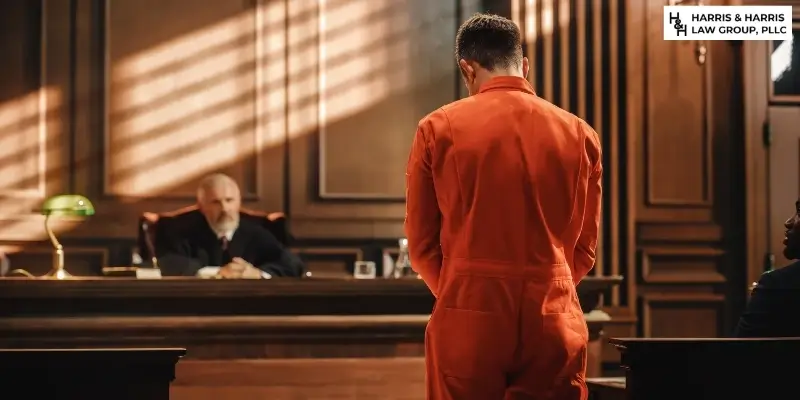Garland Criminal Defense Lawyer

Garland Criminal Defense Attorney
Facing criminal charges can be extremely disruptive to someone’s life, especially considering the severity of consequences that could follow. All of this can feel like an attack on your reputation and freedom. However, it’s important to remember that not all criminal accusations will end up being proven true. Everyone charged with a crime has the right to defend themselves. If you have been charged, you need support from a Garland criminal defense lawyer.
At Harris & Harris Law Group, PLLC, we have spent years defending the rights and interests of clients in Garland and the greater Dallas-Fort Worth area. Our attorneys, Kevin and Keith Harris, are former prosecutors with deep knowledge of the criminal justice system. It’s what makes the firm unique, as we pride ourselves on being able to leverage our education and experience to offer personalized legal services that protect our clients’ rights and needs.
What Rights Do Criminal Defendants Have?
The United States Constitution provides a number of different protections for anyone who has been accused of committing a crime. It’s designed to ensure that every citizen, regardless of what they have been charged with, has a right to be treated fairly by the criminal justice system.
Some of the most important rights to be aware of include:
The Right to Remain Silent (Fifth Amendment)
The Fifth Amendment of the United States Constitution was designed to protect anyone from being able to incriminate themselves after being accused of criminal activity. This means that during an arrest or while being questioned by law enforcement, no one is required to provide any specific statements that could be used against them later in court. If a law enforcement officer does not inform you of this right during an arrest, it could make any statement inadmissible in court.
The Right to Legal Counsel (Sixth Amendment)
In the Sixth Amendment, everyone is granted the right to legal representation at any point in a criminal proceeding. If you cannot afford legal services, the court has a duty to appoint one for you. This ensures that, regardless of someone’s financial situation, you are still able to have a trained attorney supervising your case and protecting your rights. They will also ensure you do not unknowingly waive any of your other rights that you need to succeed.
The Right to a Fair and Public Trial
Anyone who is accused of breaking the law has a right to defend their interests in a trial. This is another right afforded to citizens to ensure that a defendant is not subjected to a secretive or biased trial that would unfairly skew the final results. A fair trial means that both judges and the jury remain impartial throughout the entire process. The selection of jury members is taken very seriously, and the courts aim to weed out anyone who may harbor biases related to the case.
The Right to Be Informed of the Charges
Under the Sixth Amendment, everyone has the right to know what they are being accused of. This is to ensure that no one is taken in under vague terms or overly broad charges that make it impossible for the defendant to know how to work on their case and defend their interests later on in court. When a defendant is fully aware of what they are being accused of, it allows them to combat the specific laws they are alleged to have violated with the help of a defense lawyer.
The Right to Confront Witnesses
There is a confrontation clause in the Sixth Amendment that ensures all defendants are able to challenge a witness after they give testimony against them. It helps to ensure that a defendant is not subjected to testimony that goes unchallenged.
These rights work toward ensuring that everyone is granted the right to a fair trial.
FAQs About Garland, TX Criminal Defense Laws
What Is the Difference Between a Criminal Prosecutor and a Criminal Defense Attorney?
A criminal prosecutor is someone who represents the government and is responsible for charging a case that proves a defendant is guilty of committing a crime. They are responsible for investigating the case, gathering evidence, and presenting a compelling argument that helps to secure a conviction. A criminal defense attorney, on the other hand, advocates for a defendant by arguing or presenting evidence that potentially mitigates, reduces, or even dismisses the defendant’s criminal charges.
Who Has the Burden of Proof in a Criminal Case?
In all criminal cases, the burden of proof lies with the prosecution. This means that it’s up to a prosecutor to collect their own set of evidence to prove that a defendant is guilty of the charges beyond a reasonable doubt. While the defense team does not have to necessarily prove their client is innocent, they still have to combat these allegations by creating doubt that the prosecution’s case is legitimate. They can suggest that alternative explanations exist, too.
Can a Defendant Represent Themselves in a Criminal Case?
While it’s true that a defendant has the right to defend themselves in a criminal case, known as “pro se” representation, it is not recommended. Many judges will warn defendants about the risk of self-representation, such as how challenging it can be to navigate the criminal justice system alone without any formal training or experience in the space. While it might be a tempting decision to save on costs, the risks could jeopardize the outcome of your case.
What Does It Mean to Plead the Fifth?
When someone says they want to “plead the fifth,” it means they would like to invoke their Fifth Amendment right to remain silent and avoid saying anything that could incriminate them. This means that the defendant cannot be forced to say anything that could be used as evidence against them later in court. Despite popular myth, exercising the right to remain silent is not seen as an admission of guilt but rather as taking a legally recognized enforcement measure.
Contact Harris & Harris Law Group, PLLC Today
If you have recently been accused of committing a crime in Garland and are unsure what steps to take next, contact our law firm today. We have a strong understanding of your rights in this situation and would be happy to take on your case to ensure you receive the fair trial you deserve.


